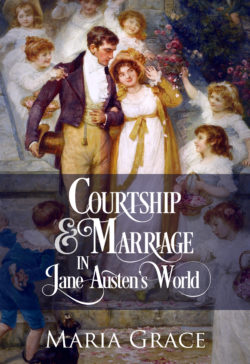To Love, Honor and OBEY in Jane Austen’s World
Though nearly all of Jane Austen’s works end with a love match and a wedding, she does not represent the prevailing attitudes about love and marriage of the day.
What did regency marriages look like?
Marrying for Love was Unlikely
While love might have been on the minds of regency era couples, they generally expected it to come AFTER marriage (if at all), rather than before. For most, practical considerations were the backbone of most matches.
Moreover, whatever warm and fuzzy feelings might develop did so in the context of a clear patriarchy. In regency society, no one doubted that the husband was the head of the relationship, in charge of essentially everything
There cannot, indeed, be a sight more uncouth, than that of a man and his wife struggling for power: for where it ought to be vested, nature, reason, and Scripture, concur to declare;
… How preposterous is it to hear a woman say, ‘ It shall be done!’ —’ I will have it so!’ and often extending her authority not only beyond her jurisdiction, but in matters where he alone is competent to act, or even to judge. (Taylor, 1822)
Coverture strikes again
Remember, under legal coverture, women had no legal existence; the husband existed for them both in public life. He owned all property, had custody of the children, conducted all business transactions on the family’s behalf, even owned the wife’s earnings should she have income of her own. (A little hard to find the upside in this, isn’t it?)
He even had the right to physically chastise his wife, divide her from friends and family and severely curtail her movements, if he so wished. (Jones,2009) Mr. Darcy, could have legally forbidden Elizabeth from associating with her disgraceful relations had he chosen to do so.
Though this might sound like a recipe for creating petty tyrants, Rev. Thomas Gisborne (1797), a moralist of the era, argued that true marital harmony came from the husband taking pre-eminence over his wife. She need not fear though, if he were a religious man, he would follow God’s will and be a kind protector for whom she would, in gratitude, be endlessly good-tempered and pleasing. Sounds exactly like the marriage the Bennets of Pride and Prejudice enjoyed, doesn’t it?
Maybe not so much.
Advice to the married woman
Conduct writers agreed, it was right and appropriate for women to have the subservient role. Catherine Macaulay, a staunch promoter of female education held that husbands had the right to expect obedience from their wives, but that they should in their turn treat wives as their best friends. (Jones, 2009) Ann Taylor (1822) advocated, “A man of common understanding, though he may derive benefit from his wife’s advice, certainly ought not to be governed by her.”
Consequently, women needed to be prepared to be tolerant of a difficult husband. It was the price of being a married woman.
On your part, you promised to love as well as to honour and obey; and probably from the all-perfect being to whom you then surrendered yourself… But, however discreet your choice … by degrees the discovery … that you have married a mortal, and that the object of your affection is not entirely free from the infirmities of human nature. Then … your disappointment may be moderated; and your love, so far from declining, may acquire additional tenderness, from the consciousness that there is room for mutual forbearance. (Taylor, 1822)
A proper wife had limited power for direct control over anything in her life, especially her husband. According to Gisborne (1797) her indirect influence should be channeled through affection, example and charms rather than through boldness or strength, all while being submitted to her husband’s wishes in all things.
If all this seems a bit unfair, take heart, even conduct writers realized it: “The World in this is somewhat unequal, and the masculine Sex seems to play the Tyrant… “(The Whole Duty of a Woman, 1737) But fear not, there was compensation for the woman. “But if in this it lies under any Disadvantage, it is more than recompens’d, by having the Honour of Families in their Keeping. “(The Whole Duty of a Woman, 1737)
That certainly rectified all the disadvantages, right?
Find References Here!
To Read more articles on weddings, click here.
To read more articles on courtship click here.
To read more articles on marriage click here.
Want to learn more? Try Courtship and Marriage in Jane Austen’s World, available in ebook and paperback
.
Please support this author and website by using this affiliate link.


I really enjoyed this post and remembered how, in the early 70’s, I bristled at the words ‘obey’ in my own wedding. Now days, I think many write their own vows and leave ‘obey’ out of the ceremony. The feminist movement nearly wiped it out completely. I believe in fairness but in reality… I don’t want to lead. I want to be the help-met that stands beside. Together we stand and conquer.